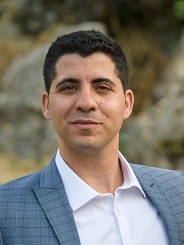Dr. Ben Ohayon recently joined the faculty of the Technion’s Department of Physics after returning from a 3.5-year post-doc fellowship in Prof. Paolo Crivelli’s lab at ETH Zürich’s Institute of Particle Physics and Astrophysics. Dr. Ohayon’s new lab at the Technion focuses on researching exotic atoms and nuclei using high-precision methods from atomic physics. This field integrates his doctoral studies, which dealt with the interface between atomic and nuclear physics, with his post-doctoral research on exotic atoms.
Exotic atoms are like ordinary atoms in which one or more of the particles is switched with an exotic particle – one that has unusual properties. For example, the electron in a hydrogen atom could be replaced with a negative muon. Muons are fundamental subatomic particles similar to electrons, although they weigh 200 times more – which is why they are often called “the electron’s heavy cousin.”
Ohayon’s research group is currently engaged in two main experiments, both of which involve muons. The first is part of the MuMASS (MuoniuM lAser SpectroScopy) collaboration led by Prof. Crivelli in Zürich, which is pushing the forefront of Muonium spectroscopy. “Muonium consists of a positive muon and an electron, and it is the simplest atom in nature. We use it to search for new physics and to test quantum electrodynamics. The motivation for Muonium comes from studying quantum physics,” Ohayon explains. One of the main goals of this research is to measure muon’s mass, which Ohayon and Prof. Yotam Soreq, a colleague from the Department of Physics, have shown to be a crucial ingredient in shedding light on the muon g-2 puzzle.
During his post-doc, Dr. Ohayon’s team was the first to perform precision measurements of the Lamb shift in Muonium, an effect that only exists when you combine quantum physics with relativity. “Physicists weren’t certain if it exists until they measured it in hydrogen, but we were the first to measure it precisely in Muonium, a much simpler system,” he points out, adding that he now aims to increase the precision of the Lamb shift in Muonium and to extend these measurements to the fine structure as well.
The second experiment involves muonic atoms, where all the electrons are changed into one negative muon. These exotic atoms are created by stopping negative muons in light target materials. “For muonic atoms, the situation is opposite than with Muonium; nuclear physics is amplified so we can study it with high precision.” For this goal Ohayon has founded and now co-leads an international collaboration which uses modern tools from quantum sensing technology – superconducting detectors inside cryogenic refrigerators – to measure X-ray energies with high accuracy.
Dr. Ohayon builds the systems at the Technion and then ships them to particle accelerators in Switzerland: the CERN (European Organization for Nuclear Research accelerator for anti-matter and the Paul Scherrer Institute (PSI) accelerator for atoms containing muons. However, he aspires to conduct an entire experiment at the Technion from start to finish. Recently, he received a Nevet grant from the Helen Diller Quantum Center to fund an experiment to study the feasibility of measuring the atomic energies of tritium, a radioactive isotope of hydrogen. “No one has measured it with high accuracy; the last effort was 35 years ago, but with low accuracy. The tools we developed at the accelerators in Switzerland could be used to do that here at the Technion,” he elaborates. Together with two colleagues, Prof. Yuval Shagam and Prof. Michael Krueger, and with the support of the Helen Diller Quantum Center, he intends to explore the feasibility of performing tritium spectroscopy at the Technion.
Dr. Ohayon, 37, was born and raised in Jerusalem and his academic studies also took place in that city, at the Hebrew University: a B.Sc. in Math and Physics and then a Master’s and PhD focusing on Atomic and Nuclear Physics with the Ron Group. Since moving back to Israel from Zürich last Spring, Ben and his wife and their 2-year-old son live in the Technion’s housing for young faculty. When he isn’t working on his research or running after his son, he likes to swim and listen to heavy metal music. He and his wife also enjoy escape rooms and they have already visited over 100 of them around the world!
Dr. Ohayon’s lab at the Technion was ready soon after he arrived, and he has already recruited two Master’s students to the group. This semester, he will teach a course on exotic atoms, which he hopes will attract more students to this field.
When asked about his recent move from Zürich to Haifa, Ben Ohayon smiles. “It’s fun to work with Israelis again. Here, you work faster and you converge on what is correct faster. Israeli students are more mature, and they aren’t shy to share their opinion. Israeli culture is very well suited for science,” he concludes.

